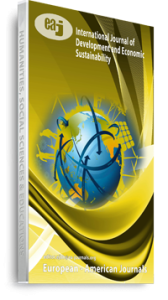This study sought to provide more insights on the topic “fiscal policy and economic development” by extending its focus to examining the relationship between fiscal policy and economic development using human development index (HDI) as a more comprehensive representation of human and economic progress than the gross domestic product (GDP). The study adopts an ex-post facto research design to enable the use of Nigerian time series data from 1990 to 2017in an Ordinary Least Square (OLS) regression technique for analyses. Findings reveal that fiscal policy variables such as government revenue and expenditure have negative effect on the gross domestic product but positive and significant on human development index of Nigeria, while government debt has positive effect on GDP and significantly negative effect on HDI. Results further reveal interesting outcomes on the effect of fiscal policy on Nigeria’s economic development such trade depicting a negative and significant effect on HDI but positive and insignificant for GDP. The study, therefore recommends that using HDI to measure the effect of fiscal policy may be a better approach to measuring economic development. Also, that the government of Nigeria should engage in more productive and try to improve on the mechanisms to grow its revenue to enhance economic development in Nigeria.
Keywords: Economic Development, Fiscal Policy, Gross Domestic Product, Human Development Index

